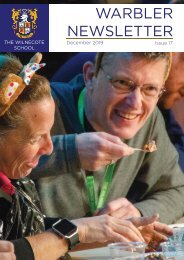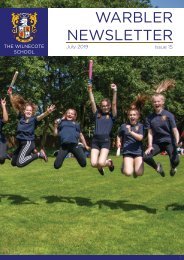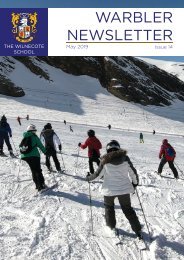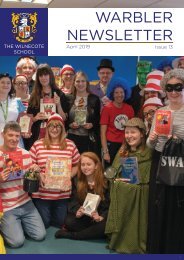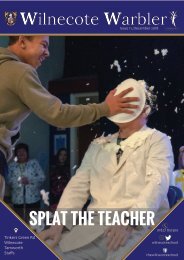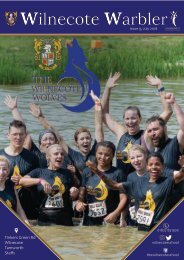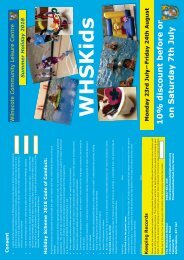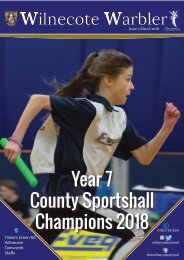Warbler February 2019
You also want an ePaper? Increase the reach of your titles
YUMPU automatically turns print PDFs into web optimized ePapers that Google loves.
SCIENCE<br />
SCIENCE NEWS<br />
Stuff you didn’t know you didn’t know!<br />
Why don’t spiders get caught in their own web?<br />
Spiders only put glue droplets on some of their strands of silk,<br />
and they tend to avoid these as they move around their web.<br />
Spiders also only touch the web with the tips of their feet<br />
(‘tarsi’), which have a non-stick coating. In addition, a special<br />
claw on the end of each foot grips the web and pulls it against<br />
springy hairs. When the claw is released, the springy hairs push<br />
the web strand away, stopping it from sticking.<br />
Wilnecote <strong>Warbler</strong><br />
<strong>February</strong> 2020<br />
Calculators - Please remember that all Y9, Y10 and Y11 students are expected to bring a<br />
scientific calculator to all science lessons. If they don’t, they will be issued with a half hour detention<br />
for lack of equipment.<br />
Y11 Revision - After half term we begin our revision program. Each student has been given a<br />
program and this has also been assigned to them on Doddle, just in case they lose it. Additionally,<br />
a parent version has been sent home via the text link service. You will need to ask your child which<br />
science group they are in.<br />
This revision program does not in any way replace the revision they should now be doing at home,<br />
but it will give them a structure to follow which may help. We are also running revision intervention<br />
after school every Thursday. These sessions will focus on the work covered that week.<br />
23equations.com - This is a great app,<br />
available for free in the App store and on Google<br />
play. It gives tutorials and revision quizzes for all<br />
the equations used in the exam - a great way to<br />
revise.<br />
4BPM<br />
In Numbers<br />
The heart rate (in beats per minute) of a<br />
diving blue whale, measured by a team at<br />
Stanford University.<br />
80%<br />
The percentage of children worldwide,<br />
aged 11 to 17, who get less than 1 hour per<br />
day of exercise, according to the World<br />
Health Organisation.<br />
23 Teaspoons<br />
The amount of sugar found in some festive<br />
drinks sold in high-street coffee shops.<br />
10



